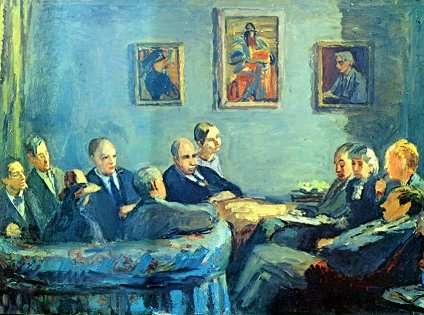One of the joys of visiting my father during the holidays is the way that poetry gets thrown back and forth. He’s constantly sharing poems that seem relevant for any occasion—a practice which, now that I think about it, helps account for Better Living through Beowulf.
Two days ago he was telling me about a course he took with poet Karl Shapiro when he was a graduate student at the University of Wisconsin in the late 1940’s. Shapiro liked his poetry but counseled him to avoid light verse. It’s advice that my father has not followed—and while I can’t imagine him writing anything else, it is true that light verse writers seldom become famous (Lewis Carroll and Edward Lear being notable exceptions).
Two nights ago my father alerted me to a couple of humorous gems that I share with you today. I set them up as quizzes to test your cultural knowledge. Can you identify those referred to in the following two comic poems? The answers can be found after the break.
Bloomsbury Snapshot
By Connie Bensley
Virginia’s writing her diary,
Vanessa is shelling the peas,
And Carrington’s there, hiding under her hair,
And squinting, and painting the trees.
Well Maynard is smiling at Duncan,
A little to Lytton’s distress,
But Ralph’s lying down with a terrible frown
For he’d rather be back in the mess.
There’s Ottoline, planning a party–
But Leonard’s impassive as stone:
He knows that they’ll all sit around in deck chairs,
Discussing their own and each others’ affaires,
And forming, perhaps, into new sets of pairs:
And oh, how the bookshelves will groan!
And now an anonymous limerick from the 1920’s:
There’s a notable family named Stein:
There’s Gertrude, there’s Epp, and there’s Ein.
Gert’s prose is the bunk;
Ep’s sculpture is junk;
And no one can understand Ein!
Further background on all these figures can be found after the break.
Virginia is of course is the great modernist novelist Virginia Woolf, and painter Vanessa is her sister, who had an open marriage with Clive Bell and had an affair with painter Duncan Grant, who was also gay. Dora Carrington longed after Lytton Strachey, author of The Eminent Victorians, but he was gay, as was economist Maynard Keynes. (Before marrying ballerina Lydia Lopokova later in life, Keynes had a relationship with Grant and had a love rivalry with Strachey.) Ralph Partridge, a member of Parliament (the “mess” that is referred to, lived with Carrington, with whom he had an affair, and Strachey. Lady Ottoline Morrell, who had affairs with both women and men (including philosopher Bertrand Russell and art historian Roger Fry), was a great one for giving parties (she’s the affected hostess who appears in D. H. Lawrence’s Women in Love). Leonard Woolf, husband of Virginia and the only monogamist in the bunch, wrote a five-volume autobiography.
I don’t agree with the sentiments in the limerick (although admittedly a lot more people understand Einstein now than they did back then) but find it very funny anyway. Gertrude Stein wrote fairly dense poetry and prose and Jacob Epstein was a fine sculptor.


